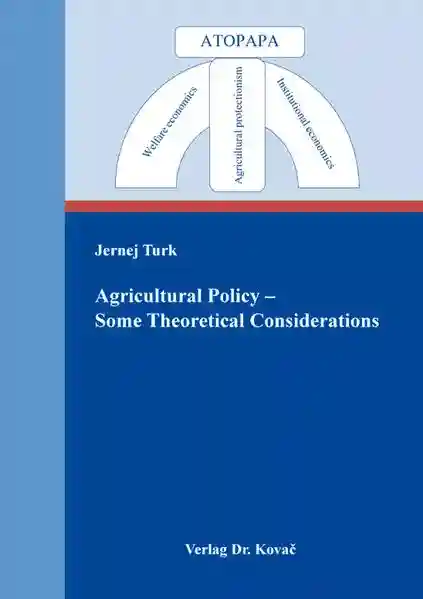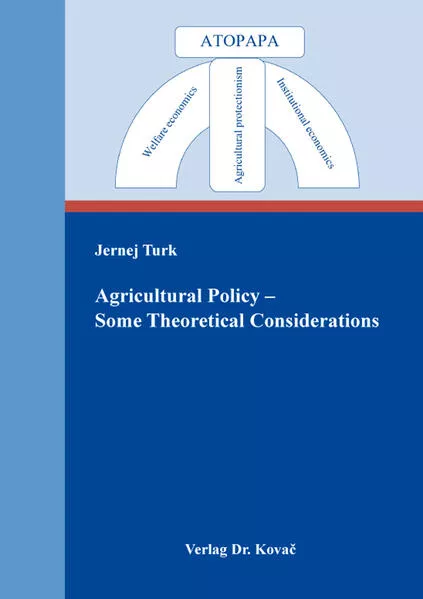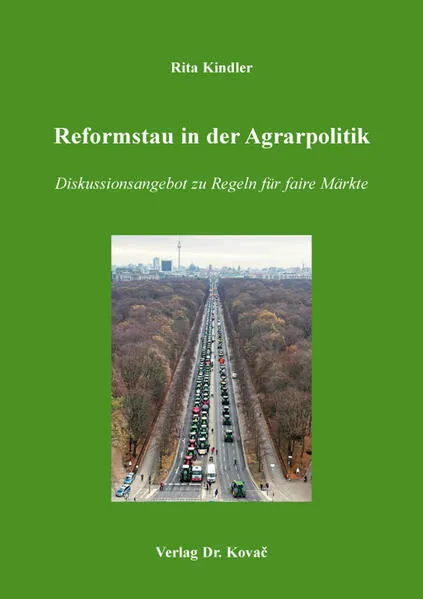Schriftenreihe Agrarwissenschaftliche Forschungsergebnisse
Agricultural Policy – Some Theoretical Considerations
Chronologie aller Bände (1 - 2)

Die Reihenfolge beginnt mit dem Buch "Agricultural Policy – Some Theoretical Considerations". Wer alle Bücher der Reihe nach lesen möchte, sollte mit diesem Band von Jernej Turk beginnen. Die Reihe umfasst derzeit 2 Bände. Der neueste Band trägt den Titel "Reformstau in der Agrarpolitik".
- Anzahl der Bewertungen für die gesamte Reihe: 0
- Ø Bewertung der Reihe: 0
Diese Reihenfolge enthält 2 unterschiedliche Autoren.
- Band: 83
- Autor: Turk, Jernej
- Anzahl Bewertungen: 0
- Ø Bewertung:
- Medium: Buch
- Veröffentlicht: 01.09.2023
- Genre: Politik
Agricultural Policy – Some Theoretical Considerations
This book considers a theory of agricultural policy and its implications for decision making.
There exists a strong and instrumental bond between agricultural economics and agricultural policy. Policy decision making can be as effective as long agricultural economics theory and the empirical modelling results derived support it. A bulk of various information sources related to farm policies can be traced in modern literature where discussions, however, rarely revolve around the theoretical issues of agricultural policy. Since a considerable lack of relevant theoretical discussions exists in policy studies, this book attempts to fill this gap.
Some new theoretical developments are presented in this research monograph. A trinity of principal agricultural policy aspects (ATOPAPA), which is incorporated inside welfare economics, institutional economics and agricultural protectionist platforms, was introduced here. These three concepts are believed to represent a sterling cornerstone in effectively contemplating basic theoretical agricultural policy considerations. This trinity of aspects is projected to be crucial in explaining thoroughly and grasping comprehensively any relevant policy development or agenda regardless of its origin, characteristics and importance.
Clear underpinnings of the main theoretical concepts that underlie the scientific character of agricultural are discussed here. A comprehensive understanding of the abundance of theoretical aspects of agricultural economics is complemented with the crucial dimension of farm policy, which both enables us to understand better the basic principles of the latter entirely. Political connotation of agricultural policy making process is significantly under the scrutiny here. A hexagram of democratic society was thus launched to reflect the interaction and mutual interdependence of farmers, taxpayers and institution of market on one side and political nomenclature, civil society and religious organisations on the other side.
Future agricultural policy developmental trends (with the emphasis on the CAP) are envisaged in the last part of this book. Three strategic and ultimate objectives of modern farm policy are highlighted: economically viable production of healthy and safe food, sustainable management of natural resources and balanced territorial development. The future of modern agricultural policy rests in its ability to collect accurate and relevant information and to convey that information to policy beneficiaries in a timely manner.
There exists a strong and instrumental bond between agricultural economics and agricultural policy. Policy decision making can be as effective as long agricultural economics theory and the empirical modelling results derived support it. A bulk of various information sources related to farm policies can be traced in modern literature where discussions, however, rarely revolve around the theoretical issues of agricultural policy. Since a considerable lack of relevant theoretical discussions exists in policy studies, this book attempts to fill this gap.
Some new theoretical developments are presented in this research monograph. A trinity of principal agricultural policy aspects (ATOPAPA), which is incorporated inside welfare economics, institutional economics and agricultural protectionist platforms, was introduced here. These three concepts are believed to represent a sterling cornerstone in effectively contemplating basic theoretical agricultural policy considerations. This trinity of aspects is projected to be crucial in explaining thoroughly and grasping comprehensively any relevant policy development or agenda regardless of its origin, characteristics and importance.
Clear underpinnings of the main theoretical concepts that underlie the scientific character of agricultural are discussed here. A comprehensive understanding of the abundance of theoretical aspects of agricultural economics is complemented with the crucial dimension of farm policy, which both enables us to understand better the basic principles of the latter entirely. Political connotation of agricultural policy making process is significantly under the scrutiny here. A hexagram of democratic society was thus launched to reflect the interaction and mutual interdependence of farmers, taxpayers and institution of market on one side and political nomenclature, civil society and religious organisations on the other side.
Future agricultural policy developmental trends (with the emphasis on the CAP) are envisaged in the last part of this book. Three strategic and ultimate objectives of modern farm policy are highlighted: economically viable production of healthy and safe food, sustainable management of natural resources and balanced territorial development. The future of modern agricultural policy rests in its ability to collect accurate and relevant information and to convey that information to policy beneficiaries in a timely manner.
- Band: 84
- Autor: Kindler, Rita
- Anzahl Bewertungen: 0
- Ø Bewertung:
- Medium: Buch
- Veröffentlicht: 01.07.2024
- Genre: Sonstiges
Reformstau in der Agrarpolitik
Die Autorin arbeitete 18 Jahre in einem agrarökonomischen Institut der DDR. Sie promovierte auf dem Gebiet der Agrarpreisbildung und habilitierte zum Thema Bodenpreise im Sozialismus.
Auch nach dem Zusammenbruch war sie als freischaffende Sachverständige für Grundstücksbewertung mit den Problemen der landwirtschaftlichen Betriebe konfrontiert. Ihre Analysen zu Boden- und Pachtpreisen und zum Landschaftsfraß und dessen Ursachen sind in Zeitschriften und anderen Verlagen erschienen.
Mit dem Thema fairer Märkte für landwirtschaftliche Erzeugnisse sowie für Bodenkauf und Pacht trifft sie auf ein Kernstück bäuerlicher Unzufriedenheit und stellt Lösungen zur Diskussion.
Auch nach dem Zusammenbruch war sie als freischaffende Sachverständige für Grundstücksbewertung mit den Problemen der landwirtschaftlichen Betriebe konfrontiert. Ihre Analysen zu Boden- und Pachtpreisen und zum Landschaftsfraß und dessen Ursachen sind in Zeitschriften und anderen Verlagen erschienen.
Mit dem Thema fairer Märkte für landwirtschaftliche Erzeugnisse sowie für Bodenkauf und Pacht trifft sie auf ein Kernstück bäuerlicher Unzufriedenheit und stellt Lösungen zur Diskussion.

